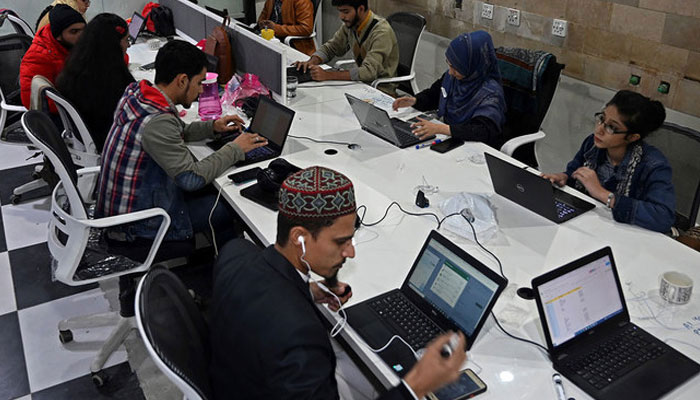Moving forward in the age of technology
LAHORE: Pakistan remains a low-value and low-tech economy as entrepreneurs for a long time thought they could compensate for low-tech machines by engaging more low-paid workers.
This approach to higher production is now ineffective as disruptive technologies have changed the way industries operate.Our economy is not prepared to tackle the creative destruction that modern technology has caused by creating enormous wealth for innovators who have made technologies introduced a decade ago obsolete.
At the start of this century, creative destruction was restricted mostly to developed economies, but now it is impacting all the services and manufacturing sectors around the globe. Disruptive technologies wiped out the most established companies in the world. For instance, in 1997, Motorola was wiped out of the mobile phone market by Nokia, which introduced the analog technology. It was in turn routed by iOS and Android technologies creating thousands of new jobs while destroying 80 per cent of jobs in Nokia.
This destructive creation is now impacting developing economies, mostly in manufacturing industries. Modern, highly efficient machines employing much less labour and consuming low power are making life miserable for Pakistani textile mills that balanced and modernized their technologies 15 years back. A similar awkward situation was witnessed in the US in 1960 when large integrated steel mills were put out of business by more efficient mini steel mills.
Though large numbers of jobs were lost by the closure of integrated steel mills, the higher productivity of mini steel mills created new jobs elsewhere in the engineering sector. One thing that the modern destructive creation makes clear is that as the output increases in existing factories, new jobs will prop up from structural changes in employment. Fewer jobs in factories with high production would increase the need to hire more sales staff and strategies to dispose of the production surplus.
The flourishing industrial cluster of today, when disrupted by new technologies, could remain on top if planners analyze the shift in employer needs and start preparing its human resources on skills that are required in the market.
Human touch will remain an important tool of economic development even after the availability of most of the information through big data. Humans will continue to enjoy a comparative advantage in social intelligence and creativity. Planners in Pakistan should focus on enhancing these skills that complement computer technologies.
It is ironic that during the first Industrial Revolution, skilled artisans were replaced by unskilled factory workers. This time it is the other way around. Now workers that acquired skills on machines produced in the last decade of the 20th century are not skilled enough to operate high-tech machines producing the same products more efficiently. A glimpse of the power of new technology has already been demonstrated in the car industry, where robots have replaced the middle-level workforce.
The challenges ahead for our economic planners are enormous. We will have to improve our education curriculum to produce a resilient workforce capable of adjusting to new technologies. The day is not far when automation in cars would make drivers redundant. Even low-skilled household worker demand may wane, as is happening in developed economies where machines and household service robots are growing annually by 20 per cent.
These disruptions will reward some and bring misery for a higher number of workers if planners fail to create skills that would be badly needed after these destructive creations. Technological progress is creating opportunities in many IT fields that include cloud services specialists, big data analysts and software developers. These services barely existed a few years back. Digital marketing professionals are in great demand as sales have shifted from brick-and-mortar stores to e-stores.
-
 Anti-monarchy Group Reacts To Prince William, Kate Middleton Statement On Epstein Scandal
Anti-monarchy Group Reacts To Prince William, Kate Middleton Statement On Epstein Scandal -
 Andrew 'must' Apologize Not Wider Royal Family For Jeffrey Epstein Links
Andrew 'must' Apologize Not Wider Royal Family For Jeffrey Epstein Links -
 Super Bowl 2026: Why Didn't Epstein Survivors Ad Air On TV?
Super Bowl 2026: Why Didn't Epstein Survivors Ad Air On TV? -
 'Harry Potter' TV Series Exec Teases 'biggest Event In Streaming': Deets
'Harry Potter' TV Series Exec Teases 'biggest Event In Streaming': Deets -
 Camila Mendes Finally Reveals Wedding Plans With Fiancé Rudy Mancuso
Camila Mendes Finally Reveals Wedding Plans With Fiancé Rudy Mancuso -
 Beatrice, Eugenie Blindsided By Extent Of Sarah Ferguson’s Epstein Links
Beatrice, Eugenie Blindsided By Extent Of Sarah Ferguson’s Epstein Links -
 Girl And Grandfather Attacked In Knife Assault Outside Los Angeles Home
Girl And Grandfather Attacked In Knife Assault Outside Los Angeles Home -
 Super Bowl Halftime Show 2026: What Did Trump Say About Bad Bunny?
Super Bowl Halftime Show 2026: What Did Trump Say About Bad Bunny? -
 Piers Morgan Defends Bad Bunny's Super Bowl Performance, Disagrees With Trump Remarks
Piers Morgan Defends Bad Bunny's Super Bowl Performance, Disagrees With Trump Remarks -
 Andrew Lands In New Trouble Days After Royal Lodge Eviction
Andrew Lands In New Trouble Days After Royal Lodge Eviction -
 Instagram, YouTube Addiction Case Trial Kicks Off In California
Instagram, YouTube Addiction Case Trial Kicks Off In California -
 Agentic Engineering: Next Big AI Trend After Vibe Coding In 2026
Agentic Engineering: Next Big AI Trend After Vibe Coding In 2026 -
 Keke Palmer Makes Jaw-dropping Confession About 'The Burbs'
Keke Palmer Makes Jaw-dropping Confession About 'The Burbs' -
 Cher Sparks Major Health Concerns As She Pushes Herself To Limit At 79
Cher Sparks Major Health Concerns As She Pushes Herself To Limit At 79 -
 Former NYPD Detective Says Nancy Guthrie's Disappearance 'could Be Hoax'
Former NYPD Detective Says Nancy Guthrie's Disappearance 'could Be Hoax' -
 King Charles Publicly Asked If He Knew About Andrew's Connection To Epstein
King Charles Publicly Asked If He Knew About Andrew's Connection To Epstein




